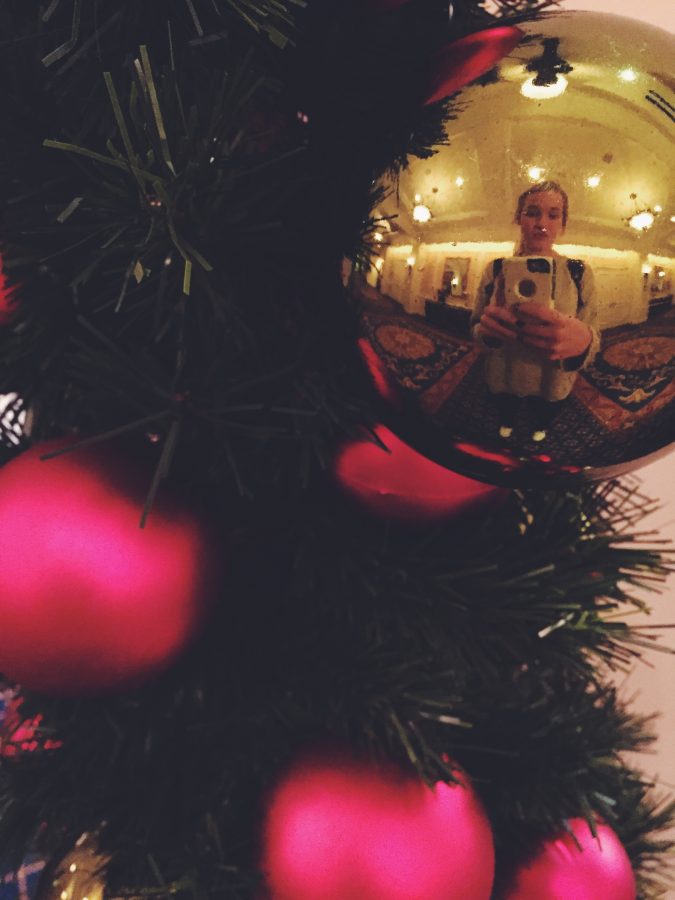Christmas Traditions Around the World
December 7, 2016
Credit: Kendall Bulleit/AchonaOnline
Rather than waiting for Santa Claus, Italian children believe in Befana, a friendly witch who delivers sweets and toys on January 5th.
Christmas is a holiday celebrated by people from all walks of life, full of customs and traditions that are special to each culture. For many, the holiday is more than just a single day; it consists an entire season to decorate and prepare for the coming of Christ. In America, Christmas is associated with holiday music, ostentatiously decorated trees, and family love, the most wonderful time of the year. Academy girls relate Christmas time to Reindeer Raffle and Christmas formal. However, for other countries, other traditions and values replace the ones America is so familiar with.
South Africa
Because South Africa is located below the hemisphere, Christmas falls in the summer. Rather than spending the month wrapped up in warm coats and drinking hot cocoa, South Africans spend the time in swimsuits and sweltering heat. Leading up to Christmas Day, kids in South Africa are told the legend of Danny, a young boy who ate Santa’s cookies and was then killed by his grandmother in her rage. The legend keeps kids from eating the cookies, claiming that Danny haunts every child’s house on Christmas Eve. On Christmas Day, locals share deep-fried caterpillars that are said to come from their great Emperor Moth.
Senior Lindsay Calka says, “It doesn’t sound right that Christmas is in the summer. A huge part of the Christmas season for me is the cold weather and hot chocolate.”

South Africa has a population of about 52 million people.
Austria
Austria shares many traditions with its neighbor, Germany, but puts their own twist on these practices. During Advent, many families make the wreaths themselves, going out to find their own evergreen trees and decorate them in their own red ribbon passed down through families. Most towns have their own Christmas markets, where everyone gathers for a week to buy decorations and goodies for the upcoming holiday. For the entire Christmas season, Austrian children live in fear of the Christmas devil named Krampus who is said to beat naughty children with branches.

The Austrian flag is one of the oldest in the world.
Norway
Rather than Santa delivering presents to children in Norway, small gnomes called ‘Nisse’ bring all the gifts personally to each family’s tree. Children go caroling often on Christmas Eve, dressing up as characters from the Christmas Story in the Bible. Norwegians are not permitted from cleaning on Christmas Eve, as they put all brooms are hidden away in case they are stolen by witches or evil spirits. The most famous Christmas tradition of all in Norway is the Christmas tree that they give to England every year, thanking them for their help during World War II.

Norway’s real name is the Kingdom of Norway.
Japan has many traditions that are completely different from any other countries around the world. On Christmas Eve, Japanese families opt out of eating a grandeur Christmas dinner and order Kentucky Fried Chicken to be delivered to their homes. Christmas Eve functions more as a day to spend with family, while Christmas Day itself is meant for couples to enjoy, similar to Valentine’s Day. Because Christmas is not a national holiday in Japan, schools and businesses do not close down around the season.

Japan is made up of 6,852 islands.
Germany
An integral part of Germany’s holiday festivities includes the celebration of Advent. Homes are filled with many different types of Advent calendars and Advent wreaths are plentiful. German children leave a shoe outside their house on December 5. Good children wake up the next morning to find sweets in their shoes while, naughty children wake up to find a branch of the Advent wreath in their shoe instead. Christmas trees are another symbol that Germany families hold in high regard. On Christmas Eve, families all gather around the tree in a circle and sing Christmas carols, hoping to serenade Christ into the world. Then, on Christmas morning, German parents hide a pickle Christmas tree and the first child to find it receives a special gift.
When she heard about the German tradition putting candy in kids’ shoes, Freshman Dorothy Pickard says, “My family also puts our shoes outside our house for sweets. But, we put our shoes out on Christmas Eve and wake up to, hopefully, find candy on Christmas morning. Also, my family is not German so I’m not sure how we adopted the tradition.”

The name for Germany in the German language is Deutschland.

